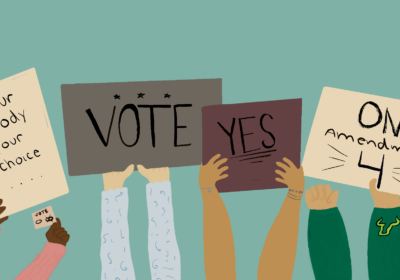OPINION: Vaping addictions should be taken more seriously as issue grows at USF
Vapes, or e-cigarettes, have replaced cigarettes in recent years as the vessel for nicotine consumption and is on the rise among college students, with 18% of USF students reporting having used a nicotine vessel like a vape in the past three months, according to the most recent National College Health Assessment.
“We are seeing a noted increase in nicotine use over the past several years,” said Kathleen Koviak, USF coordinator of drug prevention initiatives, in a Sept. 21 interview with The Oracle.
With the rise in nicotine use on campus, USF administration and students should reconsider the seriousness of vaping and its effects on young adults to better tackle this growing issue.
While vaping is often touted as the healthy counterpart to cigarettes, e-cigarettes come with many of the same risks.
E-cigarettes produce chemicals proven to cause lung cancer, heart disease, COPD and asthma, according to a 2018 study by the National Academies of Science, Engineering and Medicine.
These are just the physical health risks. Vaping has also been linked to mental health disorders.
Vaping has been used as a way for those struggling with disordered eating as an appetite suppressant to lose weight, according to a 2017 study by the International Journal of Eating Disorders.
Nicotine has also been found to be more addictive to those with ADHD and depression, as it is a stimulant that hits the same dopamine receptors as medications like Adderall and Vyvanse, without the positive mitigating effects, according to the Community Health Centers of Florida.
Despite the misconception that vaping is an effective method to quit smoking cigarettes, the U.S. Drug Enforcement Administration has found no e-cigarette to date that is a safe and effective method to quit.
Because of increased awareness of these effects, Congress passed the Family Smoking Prevention and Tobacco Control Act in 2009. This prohibited cigarette companies from distributing flavored cigarettes in order to prevent young people from picking them up. It also barred cigarette companies from aggressively marketing to young people.
Vape companies are not held to the same standard, and thus aggressively target the college demographic.
Such marketing includes offering college scholarships to high school students requiring an essay about how vapes prevent the negative effects of smoking. Juul spent over $1 million on social media marketing alone in 2015, with posts of attractive young people touting their Juuls at parties and events. Blu e-cigarettes even went so far as to sponsor Sasquatch! Music Festival in Washington, featuring the chance to sit in a vapor lounge with the top performers, smoking fruity flavored vapors.
“We have seen tobacco and nicotine companies, such as Juul and Puff Bar, use marketing strategies specifically designed to target young adults,” said Koviak. “Due to the highly addictive nature of these substances, the companies aim to get these young audiences hooked on using their products without concern for potential adverse consequences it could have on those consumers.”
Students struggling with addiction of any kind should make use of the USF Counseling Center, which has a staff of professionals trained to assist with substance abuse issues, according to Koviak.
The aggressive marketing undertaken by vape companies is working in the college demographic. The federal government should put the same restrictions on vape companies that it does on cigarettes.
As the USF community, we should take vaping more seriously as an addiction. Students should take their addiction seriously enough to seek counseling and support. To think that vaping is a trivial problem is a dangerous misconception.






